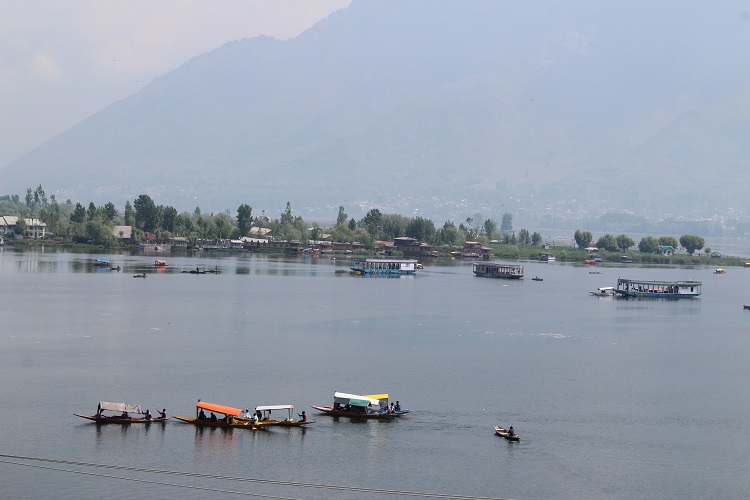
A counter terrorist operation in village Khawjapora Reban, Shopian, on the morning of 9th March, led to the killing of two terrorists associated with Hizbul Mujahedeen. These terrorists were identified as Shabir Ahmad Malik alias Abu Maviya, resident of village Tungduno Yaripora, Kulgam who had been active since December 2017 and Amir Ahmad Dar resident of Wadina Melhoura who had been active since 2019.
The operation was carried out by a joint team of the Indian Army’s Rashtriya Rifles unit and JK Police on the basis of intelligence received about the presence of terrorists in the area. The forces had laid a cordon and were conducting a search when the terrorist opened fired upon them. The terrorists were killed in the ensuing operation.
One AK-47 Rifle, one UBGL (under barrel grenade launcher) and one Chinese pistol were recovered from the encounter site. Shabir Ahmad Malik alias Abu Mayiya was a Pakistan trained terrorist presently designated as the commander of his organisation and was involved in a large number of terrorism related cases in South Kashmir.
Earlier on March 5th, terrorists had attacked a police station in Warpora in Sopore, Baramulla, in which one Policeman Wajahat Ahmed Bhat and a civilian, Umar Subhan were killed. Another policeman Showket Ahmed Khanday was injured.
On March 6th, a Grenade was lobbed by terrorists at a police checkpoint near Maharaj Gunj Zaina Kadal Police Station in downtown Srinagar leading to a civilian, Ghulam Nabi Ahnger, sustaining injuries. The previous month of February had witnessed two Grenade attacks. The first was on Central Reserve Police Force (CRPF) personnel in Lal Chowk, Srinagar, on February 2nd that caused injuries to two CRPF soldiers and seven civilians. This was followed by another Grenade attack on a police station at Pulwama on February 15th, in which no casualty was reported.
Cease fire violations by Pakistan are unabated; in the last few days itself incidents of unprovoked firing from across the border have been reported in the Mankot area of Poonch where Pakistani rangers are resorting to fire with small arms as well and mortars. Earlier on February 3rd, a civilian, Manzor Ahmad, was reported killed in cross border fire at Tangdhar sector.
It is quite clear from the foregoing that pressure from the Financial Action Task Force (FATF) and successful visit of US President Donald Trump to India has, by no means, quenched the thirst of Pakistani war machinery to create trouble in Jammu and Kashmir. The Indian security forces are, very rightly, watching the situation with an eagle eye and have kept up pressure on the terrorism machinery both within Kashmir and on the other side of the border. There has been a tight check on infiltration despite the ceasefire violations (that facilitate infiltration), having doubled in 2019 from the previous year. 3,200 incidents of ceasefire violations are reported for 2019 as compared to 1,629 incidents in 2018. A marked increase was witnessed post abrogation of Article 370 and re-organisation of the state of Jammu and Kashmir.
Pakistan is nursing a red nose on having failed to generate widespread violence and disruption in Jammu and Kashmir post the re-organisation of the region. The situation has greatly increased the levels of desperation of the country’s terrorism strategists. On the one hand they are trying to infiltrate terrorists and on the other hand they are forcing their remnants in Kashmir to keep the flame of terrorism alive. The pathetic stand-off attacks with Grenades and the incessant ceasefire violations despite no tangible results is an indication of the high level of desperation.
For India, the criticality lies in the capacity of the government to fully leverage the willing acceptance of the new dispensation by the people. The government also needs to take full use of the constituency of peace created by the security forces towards ushering an era of peace and prosperity in the region. It is to the credit of the government that it has moved assertively in this direction.
The exercise for delimitation of constituencies for the Union Territory Legislature and the Union Parliament, which constitutes the first step towards integrating the region into the rich democratic fabric of the country, has already been initiated. A Delimitation Commission headed by former Supreme Court judge Ranjana Prakash Desai has already been constituted to redraw Lok Sabha and Assembly constituencies of the Union Territory Jammu and Kashmir among other states. Election Commissioner Sushil Chandra and state election commissioners of Jammu and Kashmir and the four states will be the ex-officio members. It is hoped that the process will be completed in a timely manner and will do justice to all the peoples of the Union Territory that has a diverse ethnic and geographic profile.
The decision of some Kashmir based leaders to float a new party indicates a desire to fill in the political space in a manner that gives more option to the people who have, for long, remained dominated by two family-led, feudal entities. It is hoped that a new and young leadership will also emerge and lead the region along the desired path of development and stability.
Meanwhile the administration under Lt Governor Girish Chander Murmu has established good governance and efficient administration for hassle-free and smooth public service delivery. He has put in place an effective grievance redressal mechanism that has helped the region pass through a particularly harsh winter without any serious problem. He has been proactively applying the development plans of New Delhi in the Union Territory and is putting in special efforts to woo investors into the region. He will surely have a stable administration in place for the democratic structures to function with.
Much has been achieved in Jammu and Kashmir even as much needs to be done to achieve the desired end state. The security forces need to keep the peace constituency in place even as the government needs to boost efforts to bring in desired democracy and prosperity.
